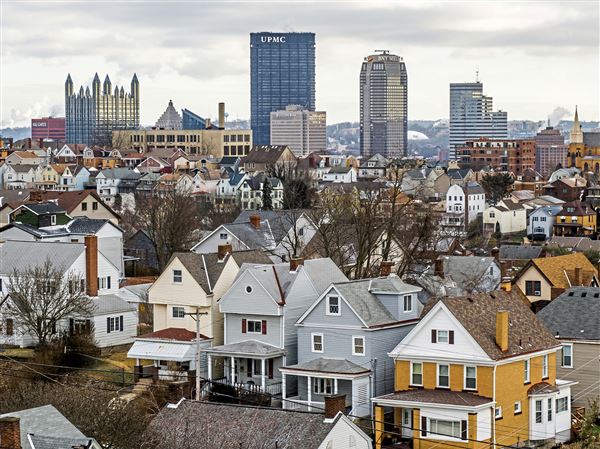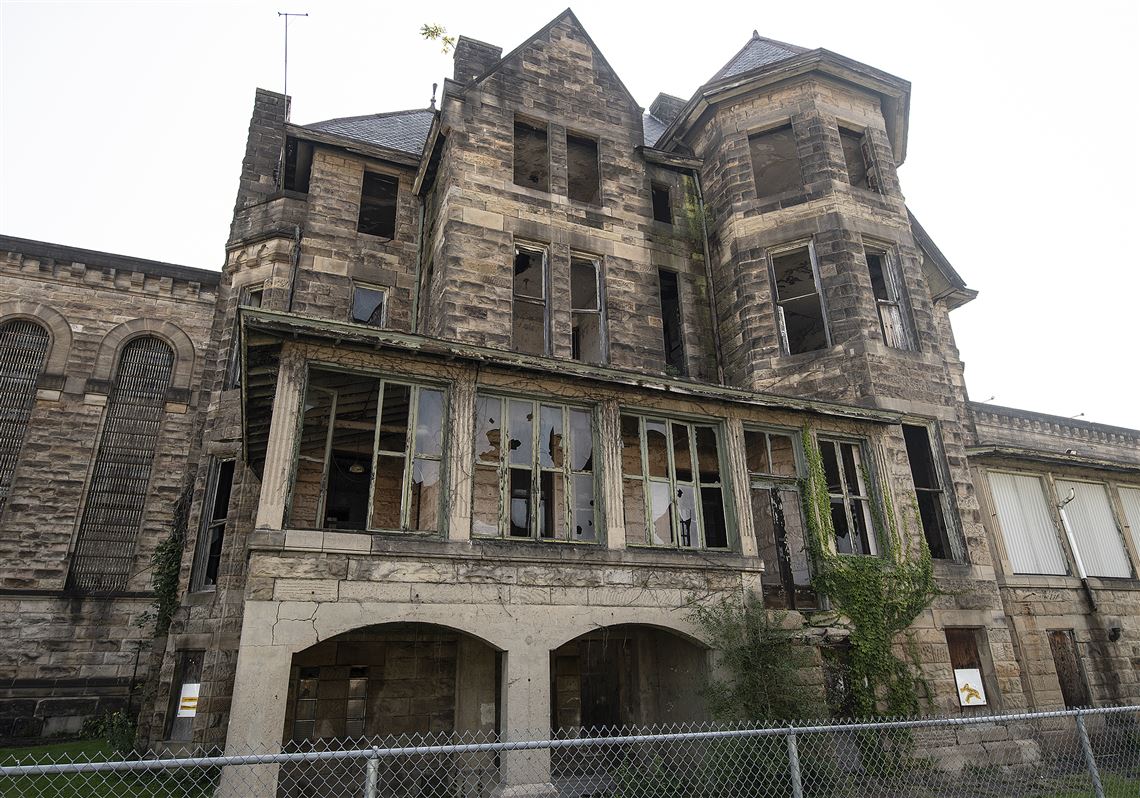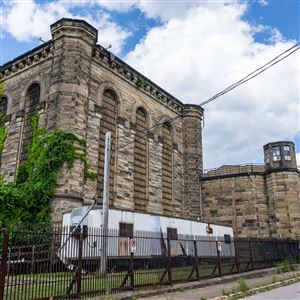It might be the government equivalent of a film director yelling cut.
The Pennsylvania Department of General Services has informed Paramount that it no longer will be able to film “Mayor of Kingstown” at the closed State Correctional Institution Pittsburgh as of next November.
That’s because the state is moving ahead with plans to raze the old prison — despite two proposals for its redevelopment and the filming that has been taking place there.
“Demolition work at the SCI Pittsburgh site is expected to start as soon as November of 2025. Due to safety concerns, once demolition work has started, filming at SCI Pittsburgh will not be permitted within the project boundaries,” said Eric Veronikis, a spokesman for the Department of General Services.
Consultant Michael Baker International recommended the prison’s razing in a feasibility study issued last year. It proposed demolishing all 42 buildings on the grounds, including the main penitentiary, at a cost of $44.4 million and repurposing the site for industrial reuse.
Mr. Veronikis said in an email that demolition and site remediation work are expected to be completed in 2027. The Department of General Services then intends to sell the property.
The timetable for starting the demolition may force Paramount to scurry to find another site for “Mayor of Kingstown.” It is set to begin filming Season 4 at the North Side prison early next year. It is planning to film seven to 10 seasons of the show.
One alternative could be the West Virginia Penitentiary in Moundsville, which has been used for filming in the past.
Paramount officials could not be reached for comment.
But Dawn Keezer, director of the Pittsburgh Film Office, said that “it is always upsetting to know that an asset in our community will no longer be available.”
“We will continue to work closely with Paramount to find other locations that may fit their needs so that we can continue to keep this economic-generating work here in SWPA for MOK season 4 and beyond,” she stated in a text message.
She added that southwestern Pennsylvania has “multiple diverse locations and great architecture that fit any film/TV project and that “our skilled, professional crews are some of the best in the country.”
In announcing a $27 million film tax credit for “Mayor of Kingstown” in February, the state estimated that the production had created more than 3,000 new jobs and pumped more than $90 million into the region’s economy. In all, the prison has been the scene of six major productions.
Such impact hasn’t been enough to persuade the Department of General Services to reconsider the Michael Baker recommendation to demolish the entire prison.
Nor has it been moved by the two proposals for the penitentiary’s redevelopment, both of which would continue to allow filming at the site.
One has been advanced by the Jordan family, which operates the former Trans-Allegheny Lunatic Asylum tourist attraction in Weston, W.Va.
It offers a variety of tours at the former hospital for the mentally ill, which closed in 1994, including some that discuss the history of treatments for patients, architecture and medical procedures used throughout the decades.
What it is proposing at Western Penitentiary is believed to be similar to that. Anthony Jordan, the Jordan family member who is spearheading the initiative, has stated that the plan would be privately funded.
Mr. Jordan said Wednesday he’s still committed to the redevelopment but keeps hitting a “brick wall” in terms of the state’s push to demolish the prison and to develop a pad-ready site for a potential reuse.
“I’m still interested in taking the building and working with the Pittsburgh Film Office, but it’s not always up to me,” he said.
He questioned the wisdom of the state’s strategy, predicting that the site would end up as a “grass field or sold at auction” or used for parking.
“They think a pad-ready site will [attract] an industrial company or some kind of manufacturing. The fact is, it’s not going to happen,” he said.
Jake Wheatley, chief of staff to Pittsburgh Mayor Ed Gainey, has said that the city supports the Michael Baker report’s recommendations in terms of demolishing the buildings and making the site development ready.
In closing the prison in 2017, former Gov. Tom Wolf committed to a strategy to make the site an employment center and to get it back on the tax rolls, Mr. Wheatley said Wednesday.
He added that Gov. Josh Shapiro has upheld that commitment.
“That’s what the community said it wanted and that’s what we’re committed to,” he said.
At the same time, Mr. Wheatley, a former state representative whose district included the prison, dismissed the idea of making Western Pen into a tourist attraction.
“We don’t want a tourist attraction,” he said. “We want something that’s going to employ people and have long-lasting impacts on the community.”
In making its recommendations, Michael Baker stated in its report that representatives of the Marshall-Shadeland neighborhood where the prison is located “voiced their strong opposition to retaining any portion of the facility, which left standing would serve as a continuing reminder of its negative emotional legacy and social injustice.”
To keep the lockup, given such concerns — “I don’t think that’s the best way to honor that community,” Mr. Wheatley said.
He noted that Michael Baker had reached out to the film industry about using the facility in the future but could not get guaranteed commitments. Absent that, “the buildings offer very little opportunity for reuse given their current physical condition,” the consultant stated in its report.
The other proposal for redeveloping Western Pen involves Thomas Tripoli, a resort owner and retired developer who has pitched the idea of turning the lockup into a jail-centric hotel and hostel and the prison into a park for recreational vehicles.
Mr. Tripoli has taken his campaign directly to the governor, urging him in writing to postpone the demolition and to “be open to receiving this viable restoration development proposal along with any others that may be offered.”
He also has sent a petition signed by more than 1,000 people, calling on the state to stop the demolition and to accept proposals for the reuse of the buildings and the courtyard.
Mr. Tripoli said Monday he has not heard anything from the governor or his aides and is planning to mount another letter-writing campaign to get Mr. Shapiro’s attention.
In its report, Michael Baker stated that demolishing all of the prison structures and repurposing the 21.7 acres for industrial reuse amounted to the most viable of the three options it studied in determining the highest and best use for the property.
It also concluded that retaining the main penitentiary building, the North Wall, and guard stations 1 and 2 for filming was “not feasible” absent a long-term agreement with the film industry.
Its favored recommendation is a costly one, though. In addition to the $44.4 million price tag to tear down the buildings, it estimated that another $3.9 million would be needed for floodplain mitigation and $1 million to remove asbestos.
While the mayor’s office is on board with the recommendations to raze the structures and prepare the site for redevelopment, it is less certain about the idea of reusing it for industrial purposes.
“We will take it one step at a time,” Mr. Wheatley said. “We want it back as development ready and then we’ll see what comes in. We think there will be a lot of opportunities for people.”
Some local preservationists have seen value in retaining at least some of the correctional institution’s buildings because of their historic significance. The site is listed as a historic district on the National Register of Historic Places, with the main penitentiary and 23 other buildings included in the nomination.
Pittsburgh History and Landmarks Foundation officials have described the warden’s residence at the prison as “very important,” lobbying to retain it and a section of cells.
But Michael Sriprasert, PHLF president, said the foundation has “made no progress” in its efforts.
First Published: November 14, 2024, 10:42 a.m.
Updated: November 15, 2024, 3:30 p.m.

















